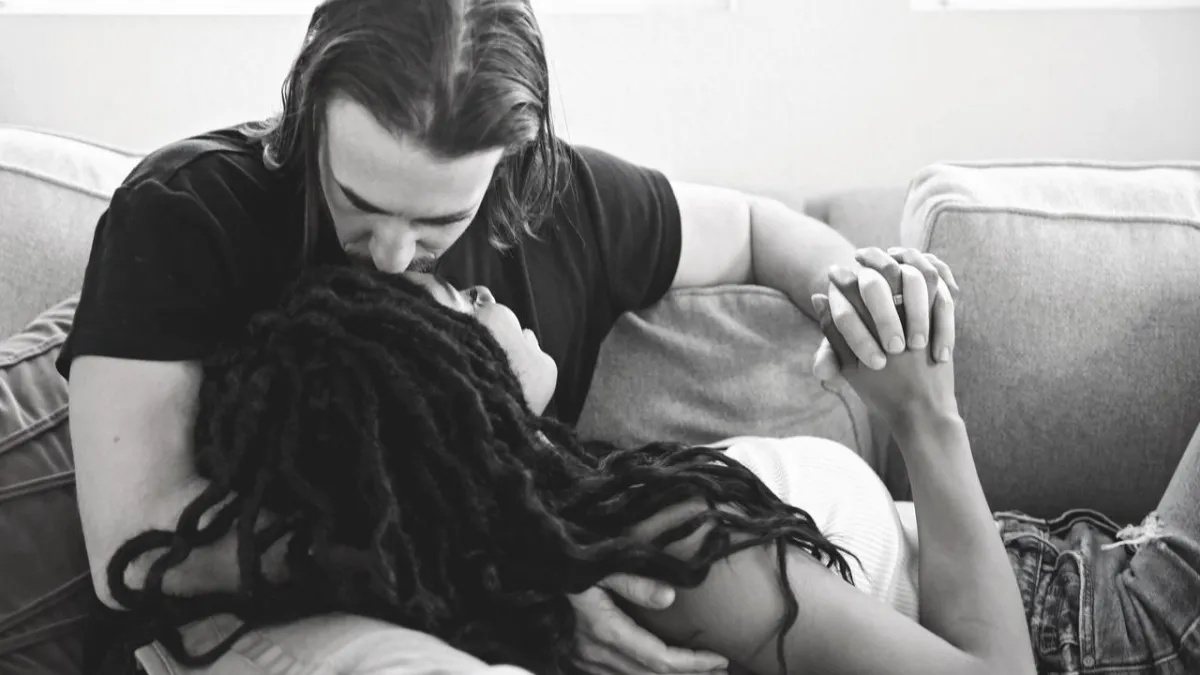What’s new on the blog?

Partnership in Parenting Q&A
One of the topics that I receive the most questions about is partnership in parenting. No matter if you’re married, in a relationship, or even separated, the goal of parenting is to come together to create the best partnership in parenting possible for you and your children.
My husband, Mike, and I sat down together to answer the most frequently asked questions around this topic. If you’re looking for even more support around this, we created a beautiful masterclass called Sacred Convergence, which is all about honoring your partnership as parents. We’d love for you to check it out. Now, let’s dive in to the Q&A!
Question #1: How do we handle big conflicts where we don’t see eye to eye?
Mike:
It's a challenge to think of a major conflict we've had, especially around parenting. We’re very fortunate for that. We don’t hold conflicting views or have moral divergences and we don’t come from different religious backgrounds. In our relationship, when we're dealing with a major conflict, the best way to get traction is for each partner to feel seen and heard. It so heavily affects my ability to move forward or progress through any challenging situation if I feel alone, isolated, and like I'm not being acknowledged. It's not a good way to start anything off. In trying to resolve a major conflict, listening to your partner and making sure that you can understand what it is they’re trying to express to you, even if you don’t agree with their position, is key. Conversely, it’s important to do what you can to help them understand where you're coming from.
Nekole:
We’ve had plenty of big conflicts in our 14+ years of being together. We are not perfect by any means, but I agree with him that in parenting, there have not been huge conflicts yet. For us specifically, taking space has been really important when things escalate. You have to know your level of emotional intelligence and be able to recognize your partner's emotional intelligence level. Our self awareness is going to dictate whether we're in a space and have the capacity and tools to even have that conversation when the stakes are high. You have to know if you have the ability to not say something that's going to cause pain or stick with your partner, or if you need to take a time out.
Mike and I have worked through this over the years where one person wants to have the conversation (usually me) and Mike needs space to sit and calm down so that he can come back to the table and have a productive conversation. In the past, I didn’t understand this, but as we’ve grown together, I understand this is part of how he processes emotions and communicates.
When we talk about honoring our partnership and parenting, regardless of your relationship status, you must become aware of your emotional intelligence level and ask yourself if it’s best for you to have a conversation right now while the feelings are high or if it would be better for you both to go to your corners, take care of yourselves, and come back when you’re able to hear each other out. When you do this, you are better able to acknowledge and validate one another's feelings and find common ground to move forward.
This is the hardest thing to do, but the most beautiful thing about it is that when we embody this and make it part of our practice, our kids inevitably see our process for working through challenging times. This is something that they will integrate and embody themselves years down the line. Know your process so that you can clean it up and it can become the most productive and efficient for your relationship and also for your parenting partnership.
Question 2: How do we feel about children witnessing arguments?
Mike:
Arguments can be really traumatic, at least they were for me when I was a child. Everyone has their disagreements and I believe there is something to be gained from witnessing healthy discourse. We have a rule in our home that we try our best to live by, and that is no yelling. We don't tolerate it from our children or each other. As long as there are some healthy boundaries around those difficult conversations, I think it can be beneficial for your children to witness some of these disagreements. There are certainly moments I wish I could have taken back, but it is something we are always working on.
Nekole:
The world needs to see more humans and imperfect beings, who don't always get it right but are devoted to becoming better, have these types of open conversations. It is vulnerable to admit when you miss the bar, but it's also empowering because oftentimes, we feel so alone because we don't have enough people contributing to these types of conversations. I think that is the power in this conversation.
This is us, in our imperfect form, giving you the best advice that we can from where we are now. We've grown a lot because we are devoted and committed. We will continue to have these conversations and I do think that kids can learn from seeing healthy conflict. Being self aware and knowing where you are in your emotional intelligence is key. If you don't have the awareness to stop yourself when you’re too emotionally charged and can’t engage in a healthy conflict, then you're going to let your emotions take the lead and damage will be caused to everyone.
If you're self aware and you know that you're able to either remove yourself from the conversation or invite your partner to join you in the conversation at a later date because it's getting too heated, that’s beautiful. Show your children what it looks like to have two differing opinions during age-appropriate conversations, how to problem solve, and that two people don't have to agree on everything, but can still find a path forward that serves everyone and shows compromise.
All of these are powerful life skills that our kids should witness. They can take that with them and understand that not only do we not have to agree all the time, but that it's safe when conflict arises. They trust that their parents have the self awareness to take space and a time out if needed. They know that at the end of the day, they still love each other so much and nothing is bigger than their love for each other and the family as a unit. If you’re going to have a disagreement in front of your children, the repairing is really important and they should see the coming together after the conflict.
Question #3: How do we make time for one another while raising two children?
Mike:
Once the kids are in bed, our “mommy and daddy time” is sacred. Even if it's just watching a show together with an adult beverage or having a deep conversation, we make it a point that every day, we spend that time together. It may only be an hour, but it’s something we look forward to on a daily basis. We are also blessed to both be self-employed and can make date days every once in a while. We really try to prioritize time for us, whether it’s a dinner out or a date night in.
Nekole:
You have to keep in mind that there are phases and chapters to parenting. The earliest days are some of the hardest because your children need you the most. Just remember, it’s not always going to be that all-consuming. Spaces will open up when you can do a lunch date or meet up for coffee when the kids are in daycare, school, or with a babysitter. Making that intentional and quality time is the key to fostering that connection and relationship.
Don’t let yourself become desensitized to the chapter or phase of parenting that you're in, because that self awareness can help you realize when you need that time together as a couple the most. If it feels like you’re butting heads a little more than usual, oftentimes it may be due to a lack of time to sit and connect with one another. That quality time is needed to bring you back together, get you on the same page, and help with the overall vibe and energy of the family.
If you're not in a committed relationship, you can help your kids feel safe in the family dynamic by doing a family activity together if your emotional intelligence allows it.
Question 4: What has been the most significant change or shift in your dynamic since raising children together?
Nekole:
We've been together for 14+ years. We’ve been married for 9 years and parents for over 6 years. We’ve ridden some waves and gone through some really dark days. In our masterclass, Sacred Convergence, we dive deep into the journey that we've had together and explain what brought us to this place we are at now. The biggest thing that shifted in our partnership is a level of trust that has brought a lot of peace to not only our relationship, but our family dynamic. I had to learn that we're two different human beings with two different backgrounds. While we have so much overlap in terms of values, priorities, and beliefs, we're still very unique and we're not always going to see eye to eye. The way that Mike would do one thing is not necessarily the way that I would do it.
When we can pan out and see the bigger picture and the big goal we have in mind for our family, we can develop more trust in ourselves and our partners. This has cultivated so much peace within our family dynamic. Not everything is a threat and not everything needs to be fixed or corrected. I trust Mike. He's not perfect and neither am I. Therefore, I'm going to show grace when grace should be shown. We're going to hang on to the things that matter most, instead of micromanaging all of the things that didn't go according to plan.
Mike:
I witness Nekole now, in motherhood, without getting entangled in the outcome of that and trying to steer it. It’s different than just a romantic relationship where the two of you are looking to give and take and feed off one another. When children come into the picture, there are instances where you are hands-off and just trust that the relationship with your partner and your child is unfolding as it should. That could probably be the source of some conflict too, if you unknowingly are trying to impose your will on the outcome of that relationship. We see more of each other now as parents, as opposed to the image we hold in our heads when you’re in a purely romantic relationship.
Question 5: What is the greatest tip for successfully partnering and parenting?
Nekole:
I think the greatest tip that I could offer is trusting that even though you are two different humans who go about life differently, regardless of how much you have in common, your children are getting exactly what they need from your partner in parenting. This is especially true for those partners and parents who aren't in a romantic relationship. Even though your relationship didn't unfold the way that you had hoped or intended when the two of you created your children together, ask yourself, can you still hold the trust that your children are getting what they need, regardless of how physically present or emotionally connected they are?
Your child learns from every dynamic, in every situation, and in every type of relationship. Sometimes the things we think we want to protect our children from the most are the things that will make them so great and capable in life. Don’t rob them or overprotect them from life. At the end of the day, these souls chose us. They chose you and your partner in parenting to learn exactly what they needed and to unlock the codes they needed in order to do everything they will go on to do in life. Ask yourself, can you hold that? Can you trust that? Can you move powerfully with that, regardless of the outcome?
Mike:
Honor the relationship of your partner and your child. The outcome is entirely irrelevant and out of your control, so you just have to honor it.
We hope this conversation around partnership in parenting has helped you and empowered you. If this is something that's pulling at you, you can join us in Sacred Convergence, where we go really deep together.
There is a powerful transformation that happens on the back end of it because we get to spend more time with you and be completely vulnerable in our process, our experience, our journey together, and how we got to where we are today.
Watch the entire Partnership in Parenting Q&A with Mike and I in my Youtube video here!

Partnership in Parenting Q&A
One of the topics that I receive the most questions about is partnership in parenting. No matter if you’re married, in a relationship, or even separated, the goal of parenting is to come together to create the best partnership in parenting possible for you and your children.
My husband, Mike, and I sat down together to answer the most frequently asked questions around this topic. If you’re looking for even more support around this, we created a beautiful masterclass called Sacred Convergence, which is all about honoring your partnership as parents. We’d love for you to check it out. Now, let’s dive in to the Q&A!
Question #1: How do we handle big conflicts where we don’t see eye to eye?
Mike:
It's a challenge to think of a major conflict we've had, especially around parenting. We’re very fortunate for that. We don’t hold conflicting views or have moral divergences and we don’t come from different religious backgrounds. In our relationship, when we're dealing with a major conflict, the best way to get traction is for each partner to feel seen and heard. It so heavily affects my ability to move forward or progress through any challenging situation if I feel alone, isolated, and like I'm not being acknowledged. It's not a good way to start anything off. In trying to resolve a major conflict, listening to your partner and making sure that you can understand what it is they’re trying to express to you, even if you don’t agree with their position, is key. Conversely, it’s important to do what you can to help them understand where you're coming from.
Nekole:
We’ve had plenty of big conflicts in our 14+ years of being together. We are not perfect by any means, but I agree with him that in parenting, there have not been huge conflicts yet. For us specifically, taking space has been really important when things escalate. You have to know your level of emotional intelligence and be able to recognize your partner's emotional intelligence level. Our self awareness is going to dictate whether we're in a space and have the capacity and tools to even have that conversation when the stakes are high. You have to know if you have the ability to not say something that's going to cause pain or stick with your partner, or if you need to take a time out.
Mike and I have worked through this over the years where one person wants to have the conversation (usually me) and Mike needs space to sit and calm down so that he can come back to the table and have a productive conversation. In the past, I didn’t understand this, but as we’ve grown together, I understand this is part of how he processes emotions and communicates.
When we talk about honoring our partnership and parenting, regardless of your relationship status, you must become aware of your emotional intelligence level and ask yourself if it’s best for you to have a conversation right now while the feelings are high or if it would be better for you both to go to your corners, take care of yourselves, and come back when you’re able to hear each other out. When you do this, you are better able to acknowledge and validate one another's feelings and find common ground to move forward.
This is the hardest thing to do, but the most beautiful thing about it is that when we embody this and make it part of our practice, our kids inevitably see our process for working through challenging times. This is something that they will integrate and embody themselves years down the line. Know your process so that you can clean it up and it can become the most productive and efficient for your relationship and also for your parenting partnership.
Question 2: How do we feel about children witnessing arguments?
Mike:
Arguments can be really traumatic, at least they were for me when I was a child. Everyone has their disagreements and I believe there is something to be gained from witnessing healthy discourse. We have a rule in our home that we try our best to live by, and that is no yelling. We don't tolerate it from our children or each other. As long as there are some healthy boundaries around those difficult conversations, I think it can be beneficial for your children to witness some of these disagreements. There are certainly moments I wish I could have taken back, but it is something we are always working on.
Nekole:
The world needs to see more humans and imperfect beings, who don't always get it right but are devoted to becoming better, have these types of open conversations. It is vulnerable to admit when you miss the bar, but it's also empowering because oftentimes, we feel so alone because we don't have enough people contributing to these types of conversations. I think that is the power in this conversation.
This is us, in our imperfect form, giving you the best advice that we can from where we are now. We've grown a lot because we are devoted and committed. We will continue to have these conversations and I do think that kids can learn from seeing healthy conflict. Being self aware and knowing where you are in your emotional intelligence is key. If you don't have the awareness to stop yourself when you’re too emotionally charged and can’t engage in a healthy conflict, then you're going to let your emotions take the lead and damage will be caused to everyone.
If you're self aware and you know that you're able to either remove yourself from the conversation or invite your partner to join you in the conversation at a later date because it's getting too heated, that’s beautiful. Show your children what it looks like to have two differing opinions during age-appropriate conversations, how to problem solve, and that two people don't have to agree on everything, but can still find a path forward that serves everyone and shows compromise.
All of these are powerful life skills that our kids should witness. They can take that with them and understand that not only do we not have to agree all the time, but that it's safe when conflict arises. They trust that their parents have the self awareness to take space and a time out if needed. They know that at the end of the day, they still love each other so much and nothing is bigger than their love for each other and the family as a unit. If you’re going to have a disagreement in front of your children, the repairing is really important and they should see the coming together after the conflict.
Question #3: How do we make time for one another while raising two children?
Mike:
Once the kids are in bed, our “mommy and daddy time” is sacred. Even if it's just watching a show together with an adult beverage or having a deep conversation, we make it a point that every day, we spend that time together. It may only be an hour, but it’s something we look forward to on a daily basis. We are also blessed to both be self-employed and can make date days every once in a while. We really try to prioritize time for us, whether it’s a dinner out or a date night in.
Nekole:
You have to keep in mind that there are phases and chapters to parenting. The earliest days are some of the hardest because your children need you the most. Just remember, it’s not always going to be that all-consuming. Spaces will open up when you can do a lunch date or meet up for coffee when the kids are in daycare, school, or with a babysitter. Making that intentional and quality time is the key to fostering that connection and relationship.
Don’t let yourself become desensitized to the chapter or phase of parenting that you're in, because that self awareness can help you realize when you need that time together as a couple the most. If it feels like you’re butting heads a little more than usual, oftentimes it may be due to a lack of time to sit and connect with one another. That quality time is needed to bring you back together, get you on the same page, and help with the overall vibe and energy of the family.
If you're not in a committed relationship, you can help your kids feel safe in the family dynamic by doing a family activity together if your emotional intelligence allows it.
Question 4: What has been the most significant change or shift in your dynamic since raising children together?
Nekole:
We've been together for 14+ years. We’ve been married for 9 years and parents for over 6 years. We’ve ridden some waves and gone through some really dark days. In our masterclass, Sacred Convergence, we dive deep into the journey that we've had together and explain what brought us to this place we are at now. The biggest thing that shifted in our partnership is a level of trust that has brought a lot of peace to not only our relationship, but our family dynamic. I had to learn that we're two different human beings with two different backgrounds. While we have so much overlap in terms of values, priorities, and beliefs, we're still very unique and we're not always going to see eye to eye. The way that Mike would do one thing is not necessarily the way that I would do it.
When we can pan out and see the bigger picture and the big goal we have in mind for our family, we can develop more trust in ourselves and our partners. This has cultivated so much peace within our family dynamic. Not everything is a threat and not everything needs to be fixed or corrected. I trust Mike. He's not perfect and neither am I. Therefore, I'm going to show grace when grace should be shown. We're going to hang on to the things that matter most, instead of micromanaging all of the things that didn't go according to plan.
Mike:
I witness Nekole now, in motherhood, without getting entangled in the outcome of that and trying to steer it. It’s different than just a romantic relationship where the two of you are looking to give and take and feed off one another. When children come into the picture, there are instances where you are hands-off and just trust that the relationship with your partner and your child is unfolding as it should. That could probably be the source of some conflict too, if you unknowingly are trying to impose your will on the outcome of that relationship. We see more of each other now as parents, as opposed to the image we hold in our heads when you’re in a purely romantic relationship.
Question 5: What is the greatest tip for successfully partnering and parenting?
Nekole:
I think the greatest tip that I could offer is trusting that even though you are two different humans who go about life differently, regardless of how much you have in common, your children are getting exactly what they need from your partner in parenting. This is especially true for those partners and parents who aren't in a romantic relationship. Even though your relationship didn't unfold the way that you had hoped or intended when the two of you created your children together, ask yourself, can you still hold the trust that your children are getting what they need, regardless of how physically present or emotionally connected they are?
Your child learns from every dynamic, in every situation, and in every type of relationship. Sometimes the things we think we want to protect our children from the most are the things that will make them so great and capable in life. Don’t rob them or overprotect them from life. At the end of the day, these souls chose us. They chose you and your partner in parenting to learn exactly what they needed and to unlock the codes they needed in order to do everything they will go on to do in life. Ask yourself, can you hold that? Can you trust that? Can you move powerfully with that, regardless of the outcome?
Mike:
Honor the relationship of your partner and your child. The outcome is entirely irrelevant and out of your control, so you just have to honor it.
We hope this conversation around partnership in parenting has helped you and empowered you. If this is something that's pulling at you, you can join us in Sacred Convergence, where we go really deep together.
There is a powerful transformation that happens on the back end of it because we get to spend more time with you and be completely vulnerable in our process, our experience, our journey together, and how we got to where we are today.
Watch the entire Partnership in Parenting Q&A with Mike and I in my Youtube video here!





